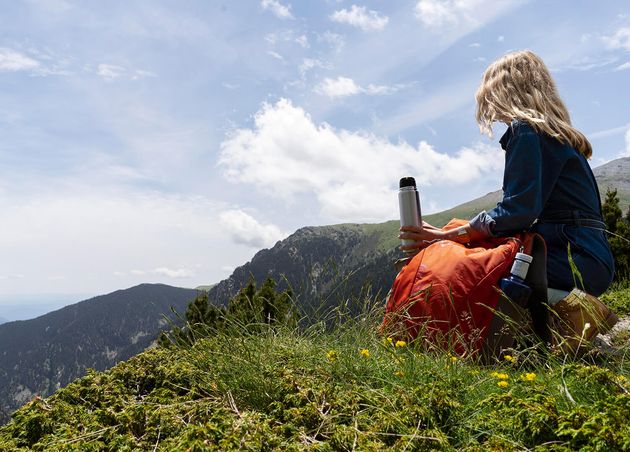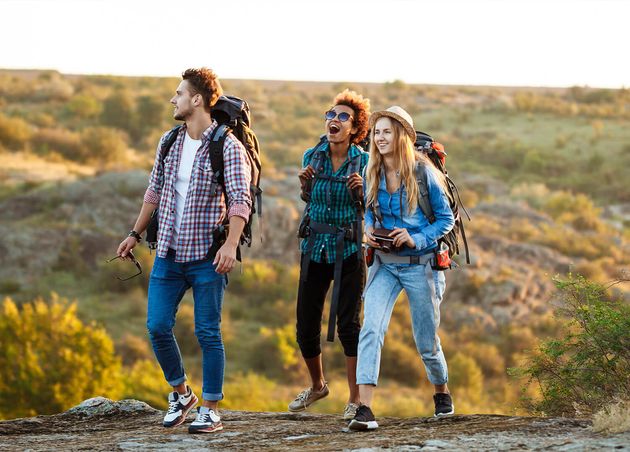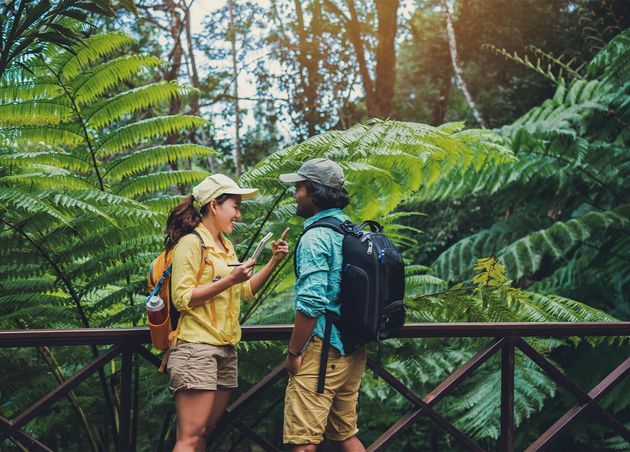Eco-Friendly Travel: Top Tips for Going Green on Your Adventures
Explore the "Green Travel" concept and understand its significance in responsible tourism. Choosing eco-friendly practices doesn't necessarily mean camping in a tent or cooking with a solar-powered stove. Instead, it involves making thoughtful choices that reduce your negative impact on travel destinations. Recognizing genuine green experiences versus greenwashing is crucial in supporting sustainable travel. Each small decision you make contributes to a collective effort, fostering a more environmentally conscious approach to exploring the world.
Sustainable travel is about mindful choices that, when combined, create a substantial positive impact. In this comprehensive guide, delve into the core of Green Travel, uncover its importance, and gain insights into easy tips that empower you to travel responsibly and sustainably. Embrace the cumulative effect of conscious decisions, making your travel experiences enriching and environmentally friendly.
While each individual choice in sustainable travel may seem small, collectively, being more conscious about these aspects can have a substantial cumulative impact.
Now, let's delve into what Green Travel is, understand its significance, and explore a comprehensive set of easy tips to guide you in traveling more responsibly and sustainably.
Green Travel Tips for a Sustainable Journe
#1 Choose Public Transportation
Public transportation, which includes trains, buses, and subways, is one of the most environmentally friendly modes of travel nowadays. Opting for these options reasonably reduces the carbon emissions associated with personal car tours.
Trains, for example, are regarded for their performance and low emissions per passenger mile. Using properly connected public transit structures helps decrease congestion on roads and also helps discount air pollution and greenhouse gasoline emissions.
#2 Use a Carpool or Bike
While private automobiles are necessary, adopt eco-friendly practices, including carpooling with friends, circle of relatives, or coworkers. Carpooling is not only highly effective in reducing emissions but also helps share the journey's expenses.
Alternative to carpooling, consider using bicycles for short distances, which is an even more cost-effective and eco-friendly mode of transport. Biking now removes emissions and promotes a physical hobby, enhancing both private fitness and environmental well-being. By choosing these alternatives, you reduce traffic congestion and promote better air quality.
#3 Stay in Eco-friendly Accommodations
While selecting hotels, prioritize eco-friendly alternatives that implement electricity-saving measures and environmentally conscious practices. Search for certifications like leed or different recognized sustainability labels.
Eco-friendly accommodations frequently incorporate renewable energy sources, efficient water usage, and waste reduction strategies. Supporting such facilities contributes to the demand for greener lodging options and encourages the hospitality industry to embrace sustainable practices.
🌏 Eco Fact!
A sustainable journey, additionally known as an eco-friendly or responsible journey, focuses on minimizing the harmful effect of tourism on the surroundings, society, and local economies.
#4 Use Reusable Water Bottles
Instead of purchasing single-use plastic water bottles, bring a reusable water bottle during your travels. This simple action significantly reduces plastic waste and contributes to the fight against the issue of plastic pollution. Many travel destinations now provide water refill stations, making it handy to stay hydrated without contributing to plastic waste. By making this switch, you contribute to reducing the intake of single-use plastics, benefiting both the environment and marine life.
#5 Purchase Carbon Offsets
#6 Support Local Businesses
Supporting local businesses for the duration of your travels will tremendously impact both the surroundings and the local economy. While you choose to spend your cash at local eating places, stores, and hotels, you contribute to the community's well-being.
Local businesses regularly depend on sustainable practices, source merchandise locally, and hire nearby residents, which helps to lessen the carbon footprint associated with transportation and supports the livelihoods of the local people. By engaging with the local economy, you create a more responsible travel experience while minimizing the harmful effects of tourism on the environment.
#7 Avoid Single-use Plastic
Minimizing single-use plastic items is a crucial step in working towards sustainable traveling. Products like plastic bags, water bottles, and utensils play an essential role in environmental pollution and the buildup of plastic waste. Bring reusable items like fabric bags, refillable water bottles, and travel utensil sets when packing for your journey.
By discouraging single-use plastic, you reduce the call for these objects, encourage groups to adopt eco-friendly options and save plastic from ending up in landfills and oceans.
#8 Reduce Energy Usage
Even while traveling, you can play a role in conserving energy. Make it a habit to turn off lights, electronics, and appliances when they are not in use in your hotel. Unplugging chargers and devices not actively charging can also help prevent "phantom" electricity consumption.
Furthermore, choose hotels prioritizing energy efficiency and sustainable practices, including using energy-efficient lighting, appliances, and renewable energy sources. These simple measures help reduce the carbon footprint associated with energy consumption.
#9 Eat Locally Sourced Food
Choosing locally sourced food during your travels significantly impacts the surroundings and the neighborhood's economic system. Locally produced food requires less transportation and storage, which reduces the carbon emissions related to long-distance transport.
Moreover, consuming locally sourced food permits you to enjoy the culinary culture of the locality and support local farmers and manufacturers. Seek out restaurants that prioritize using local ingredients and sustainable farming practices to contribute to eco-friendly tours.
#10 Avoid Souvenirs Made From Wildlife Products
Avoid products made from wildlife materials, such as ivory, leather, or individual animal parts, when buying souvenirs during your travels. The illegal trade in wildlife products contributes to the endangerment and extinction of many species. By refraining from buying such objects, you help to fight wildlife trafficking and protect vulnerable species. Instead, choose souvenirs from sustainable and ethically sourced substances, supporting neighborhood artisans and groups prioritizing environmental and moral values.
#11 Choose Eco-friendly Activities
Opting for eco-friendly activities can considerably decrease tourism's terrible effect on the environment. Sports such as hiking, biking, or kayaking are superb choices that allow tourists to connect to nature without harming it.
Hiking allows one to explore natural landscapes, enjoy breathtaking views, and engage with local ecosystems firsthand. Cycling promotes a lower carbon footprint while allowing you to immerse yourself in the environment. Kayaking offers a serene way to explore water bodies and learn about marine life without disturbing habitats.
#12 Respect Wildlife
Respecting flora and fauna is vital for preserving the sensitive stability of ecosystems. Travelers must always keep a safe distance from animals and avoid any practices that could disturb their habitats or behaviors. This means refraining from feeding wildlife, not coming near nesting or breeding areas, and no longer trying to touch or engage with wild animals. By being conscious and appreciative observers, tourists can help protect the natural world they encounter.
#13 Choose Sustainable Tours
Arranging sustainable tours helps both the environment and neighborhood communities. Look for tour operators who prioritize minimizing their ecological effect and undoubtedly contribute to the places they go to. Sustainable tours regularly contain smaller businesses, respectful interactions with neighborhood cultures, and efforts to leave minimal hints at the back. These tours can also benefit nearby groups economically, encouraging them to keep their natural resources and cultural and historical past.
#14 Use Natural Sunblock
Opting for natural sunblock is a practical approach to reduce harmful chemicals' impact on the environment and your health. Conventional sunscreens frequently include chemical compounds that could harm aquatic lifestyles and coral reefs once they wash off into the water.
Opting for herbal, mineral-primarily based sunblocks reduces the danger of contributing to coral bleaching and marine ecosystem harm. These sunblocks usually include zinc oxide or titanium dioxide, which can be less harmful to aquatic environments.
#15 Avoid Littering
Littering has a damaging effect on the environment and may harm the natural world. Travelers must permanently dispose of their waste nicely using specific trash containers and recycling centers. If those facilities are unavailable, carrying out all waste and clutter is critical, leaving no trace behind. This includes not only packaging and plastic waste but also cigarette butts and other small items. These items can accumulate and degrade natural environments over time.
🌏 Eco Trivia!
Transportation in the U.S. accounts for an outstanding 29 percent of greenhouse fuel emissions.
#16 Respect Local Customs
When practicing an eco-friendly journey, it is vital to recognize nearby customs and traditions, as this enriches your travel experience and contributes to preserving the neighborhood tradition and surroundings. By immersing yourself in the local lifestyles and adhering to their customs, you exhibit a deep appreciation for the network you are visiting. This method fosters superb interactions with locals and promotes pass-cultural expertise.
By learning and participating in local customs, you contribute to the economic well-being and support the cultural background of that area. Furthermore, by displaying admiration for the local environment and traditions, you help create a sustainable tourism version that blesses both the destination and the site visitors.
#17 Use Biodegradable Toiletries
Choosing biodegradable toiletries is a simple yet impactful step towards reducing your environmental footprint during your journey. Crafted to naturally decompose swiftly, these products aim to minimize their impact on ecosystems.
Choosing biodegradable shampoos, soaps, and other toiletries prevents dangerous chemical substances from entering water resources and harming aquatic life. This desire contributes to the general health of ecosystems and decreases pollution. It's a small change that collectively could significantly impact reducing waste and retaining the surroundings.
#18 Support Conservation Efforts
Supporting conservation efforts while traveling involves engaging with protected areas and contributing to conservation agencies. Exploring national parks, wildlife reserves, and other protected sites allows you to marvel at the beauty of nature and contributes to generating revenue for conservation projects.
Donations to professional conservation agencies similarly expand your impact. By collaborating in ecotourism sports and guided tours, you directly contribute to maintaining fragile ecosystems and protecting endangered species. This technique ensures that future generations can adore and enjoy those areas' natural wonders.
#19 Avoid Buying Bottled Water
One of the most effective green travel practices is avoiding the purchase of bottled water. You should bring a reusable water bottle and refill it with tap water or filtered water supplied by motels. This action reduces plastic waste and limits the carbon footprint of producing and transporting bottled water.
Additionally, it protects local environments from the terrible impacts of plastic pollutants. With this action, you actively contribute to a purifying planet while saving cash and resources at some stage in your travels.
#20 Take Photos instead of Taking Souvenirs
Taking photographs instead of collecting physical souvenirs is a sustainable approach to travel. Souvenirs often involve extracting natural resources, harming local ecosystems, and contributing to habitat destruction. Capturing memories through photos reduces the demand for such items and supports environmental conservation. It also reduces the clutter of unnecessary items in your luggage and at home. Sharing your travel experiences through pictures can inspire others to appreciate the world's beauty and promote sustainable travel practices.
With the help of following those tips, you can travel extra sustainably and environmentally friendly. Not only will you be supporting the environment, but you may also contribute to protecting nearby cultures and communities. The past years have witnessed rapid international tourist arrivals, resulting in economic prosperity and personal satisfaction.
However, this growth has often come at the expense of the environment and local communities, with pollution, habitat loss, and overcrowding becoming more common in popular destinations. As tourism rebounds from the challenges posed by the COVID-19 pandemic, it is evident that the way we travel needs to evolve.
Eco Bear





































